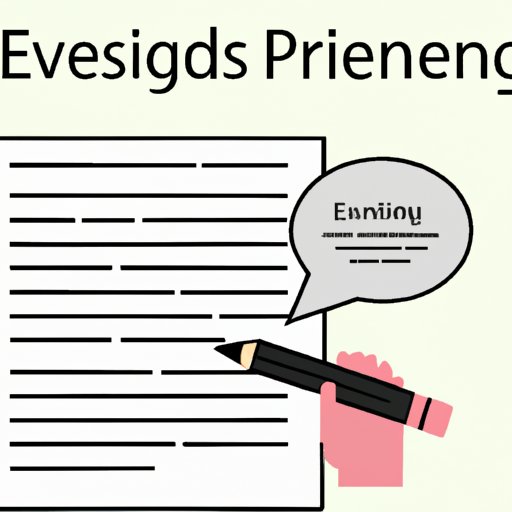Introduction
Evidence is an important part of any writing project. It helps to support claims, strengthen arguments, and persuade readers. In persuasive writing, evidence can be used to make a convincing case and prove a point. In academic writing, evidence is necessary for making well-informed arguments and demonstrating knowledge. This article will explore the importance of evidence in writing, including its role in persuasive and academic writing, how to use it effectively, and the benefits of using evidence in writing.
Exploring the Role Evidence Plays in Persuasive Writing
Persuasive writing is all about making a convincing argument. Evidence is key to making an effective argument, as it provides readers with facts, statistics, and other information that supports the writer’s claims. Evidence can include data from surveys and studies, quotes from experts, or examples from real life. By providing evidence, writers can make their points more persuasive and compelling.
When choosing evidence to support an argument, it is important to select sources that are reliable, credible, and relevant. It is also important to consider the audience when selecting evidence; for example, if the target audience is not familiar with a particular topic, evidence should be chosen that is easy to understand and accessible. Once the evidence has been selected, it should be incorporated into the writing in a way that makes sense and flows naturally.
How to Use Evidence Effectively in an Argumentative Essay
In an argumentative essay, evidence is used to support the writer’s claims and help prove their point. When selecting evidence for an argumentative essay, it is important to choose sources that are reliable, relevant, and up-to-date. Evidence should come from reputable sources such as scholarly articles, books, and websites. When incorporating evidence into an argumentative essay, it is important to explain how the evidence supports the claim being made and why it is important.
When using evidence, it is important to consider the context in which it is being used. For example, if the evidence is being presented to make a point about the environment, it should be used in a way that emphasizes the environmental implications of the issue being discussed. Additionally, it is important to use evidence in a balanced way; while it is important to provide evidence that supports the argument, it is also important to acknowledge evidence that may contradict the argument.

Critical Thinking and Research Skills: The Benefits of Using Evidence
Using evidence in writing encourages critical thinking and develops research skills. When researching evidence, writers must think critically and evaluate the sources they are using. They must ask questions such as: Is this source reliable? Does it provide accurate information? How does this evidence support my argument? By asking these types of questions, writers can develop their critical thinking skills and become better equipped to evaluate information and make informed decisions.
Using evidence also encourages writers to develop their research skills. Writers must learn how to find reliable sources, evaluate them, and determine which ones are most suitable for their purposes. This process can help writers become more efficient researchers and enable them to locate evidence quickly and accurately.

Understanding the Power of Evidence in Academic Writing
In academic writing, evidence is essential for making well-informed arguments and demonstrating knowledge. Evidence can be used to support claims, back up points, and provide evidence for theories and hypotheses. Different types of evidence can be used in academic writing, including primary sources (such as interviews, surveys, and experiments), secondary sources (such as books, articles, and reports), and tertiary sources (such as encyclopedias and dictionaries).
When using evidence in academic writing, it is important to cite the sources appropriately. This helps to demonstrate credibility and ensure that the reader knows where the evidence is coming from. Additionally, it is important to consider the context in which the evidence is being used. For example, if the evidence is being used to support a theory, it should be chosen and presented in a way that emphasizes the relevance of the evidence to the theory.

Why Evidence is Necessary for Supporting Claims in Writing
Evidence is essential for supporting claims in writing. Without evidence, claims can appear unsubstantiated and unconvincing. Evidence can be used to provide proof for the claims being made and make them more compelling and believable. Different types of evidence can be used to support claims, including facts, statistics, quotes, and examples.
When using evidence to support claims, it is important to select sources that are reliable, credible, and relevant. Additionally, it is important to explain how the evidence supports the claim and why it is important. This helps to make the claim more convincing and demonstrates that the writer has done their research and is knowledgeable about the topic.
Conclusion
In conclusion, evidence is an important part of any writing project. It helps to support claims, strengthen arguments, and persuade readers. In persuasive writing, evidence can be used to make a convincing case and prove a point. In academic writing, evidence is necessary for making well-informed arguments and demonstrating knowledge. Evidence encourages critical thinking and develops research skills, and it is essential for making convincing arguments. By understanding the importance of evidence in writing and learning how to use it effectively, writers can create more powerful and persuasive pieces of writing.
(Note: Is this article not meeting your expectations? Do you have knowledge or insights to share? Unlock new opportunities and expand your reach by joining our authors team. Click Registration to join us and share your expertise with our readers.)
